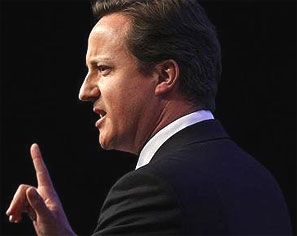British Prime Minister David Cameron has said that the 3,000-pound visa bond scheme was never targeted at India, a day after his government scrapped the controversial scheme that was aimed at restricting visitors from some Asian and African countries.
 "It was never targeted at India," Cameron said ahead of his third visit in two years to India on November 14.
"It was never targeted at India," Cameron said ahead of his third visit in two years to India on November 14.
"It was an idea suggested within government but we decided not to go ahead with the idea...We want people from India to visit Britain," he told an Indian TV channel.
India had conveyed its serious concern about the scheme to the British government both at the ministerial and official levels.
The aim of the scheme was to reduce the number of people from some "high risk" countries - including India, Pakistan, and Nigeria - staying in the UK once their short-term visa had expired.
Visitors would have paid a 3,000-pound cash bond before arrival in the UK - which would be forfeited if they failed to make the return trip.
"We have no limit on the number of students who can come," he said.
He also said he encourages a visa service for business as he wants to see the ties between the two countries grow.
Cameron, who will make a day-long visit before heading to Sri Lanka to attend Commonwealth Heads of Government Meeting (CHOGM) on November 15-16, will hold talks with Prime Minister Manmohan Singh on key bilateral and regional issues.
Cameron also said that his government is engaging with BJP's prime ministerial candidate Narendra Modi, as it does with all opposition parties in many countries.
But, he ruled out any meeting with the Gujarat chief minister during his India visit next week.
"Britain is a democracy. We talk to and engage with opposition parties in all countries - India included. If we think there are things that we've not got right, we can have free and frank discussions about those things," he told the channel.
Britain's Foreign Office Minister Hugo Swire met Modi in Gujarat in March, saying it was "a logical next step" in Britain's ties with the Indian state.











 © 2025
© 2025